What Is the Marriage Record Identification/Filing Number?
A marriage record identification/filing number refers to the number used to record the marriage license when filed by the court clerk in the county where the marriage occurred.
 Written by Background Check Repair
Written by Background Check Repair
Background Checks | June 20, 2024
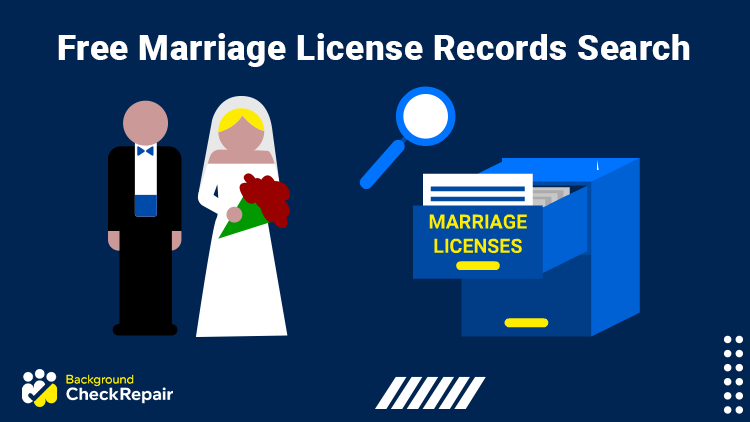
Table of Contents
There are several ways to conduct a free marriage license records search, but some ways are better than others.
Since marriage records can be somewhat ‘private,’ understanding state law about how a marriage license search can be used is crucial for keeping the search legal.
A marriage is a legal contract that binds two people together, and a marriage record is a document that proves the marriage occurred. Local authorities, religious institutions, or the government preserve this record or document for a variety of reasons.
Older records are usually stored in state archives, while the most recent ones can be found in various states’ Departments of Vital Statistics agencies and other health databases.
In order to find U.S. marriage records legally, anyone can simply use a free, name based background check tool.
This guide explains the free marriage license records search options available that comply with privacy regulations.
In the US, State laws require that these records be kept and maintained in civil records. In the US and many places over the world, marriage is a public covenant, and the people recording it do it in a variety of ways.
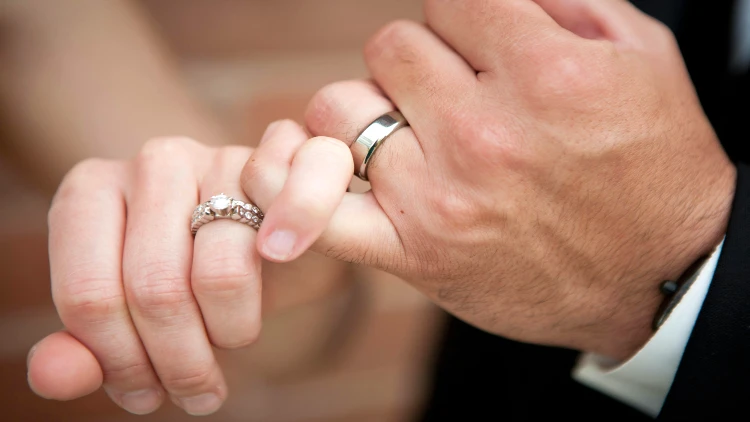
(Image: Nick Greaux9)
The clerk of the county, town, or district where the marriage occurred is the one responsible for storing this record.
Marriage records can either show intention to marry or records of the marriage ceremony. Records that indicate intent to marry include:
Traditionally, banns are announced in front of a congregation, and intentions are the notices that local civil authorities present and post in a public place for a specific period. These records are stored by the town clerk or minister in registers.
This bond is given to the official or minister who will perform the ceremony then it will be presented to the county or town clerk. These documents were standard in the mid-1800s in the Middle-Atlantic and southern states.
Licenses and applications contain the most information, including but not limited to: residence, ages, and names of the two parties. The parties present the license to the officiant of the marriage, who will then return it to the town or county clerk.
Several records document a marriage ceremony and these are the records that are used in a marital record check, before marital union background check, and other level 1 and level 2 record checks. It’s most likely that the couple will marry not long after they have announced their intention. A marriage can be conducted by:
Records that document a marriage include:
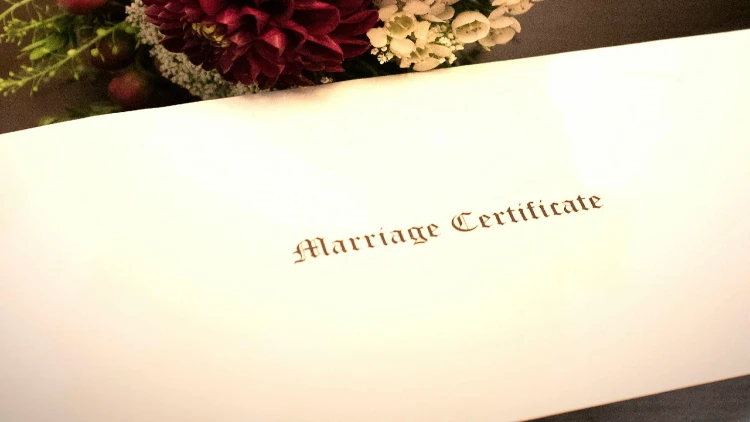
(Image: Abbey Chapman10)
An interested party can get marriage records in three ways: through the CDC, Clerk of Court, or online.
The Centers for Disease Control and Prevention4(CDC) provides various platforms through which interested parties can access marriage records as well as other vital records.1 The CDC platform is very user-friendly and contains a list of all the states. The interested party only needs to look into the state that they require.
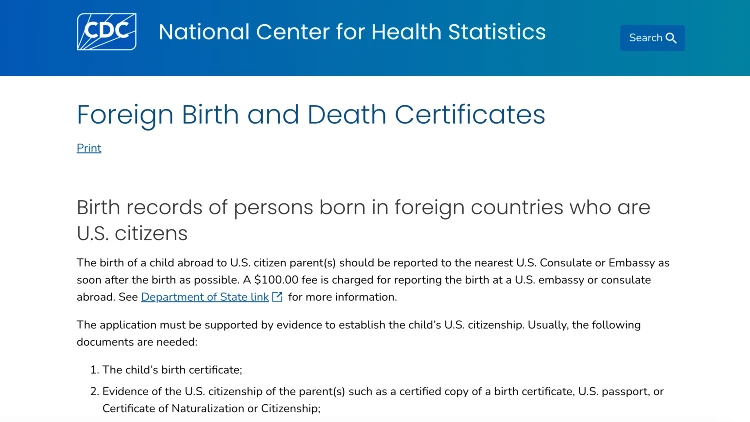
(Image: CDC4)
The CDC charges a fee ranging from $10 to $25, depending on the type of document you are looking for. Once the interested party has chosen the state, the website will provide a summary of the documents available and the fees involved.
The CDC also provides information on marriages that occur abroad. If an interested party wants to find information on marriage records of citizens of the US that happened outside the country, they should look through the CDC website or submit a request to the address provided.
An interested party can also acquire a certified copy of a divorce decree or marriage license through the Clerk of Court in the county where the divorce or marriage was issued. However, if the party does not know the county where the marriage was conducted, they may perform a different search. For example, in the state of Indiana, the party will search on the following platforms:
If the individual goes to the court where the marriage was issued, they can read the whole marriage records for free. However, the Clerk of Courts will charge a specific fee for certified copies or duplicates of marriage certificates.
Criminal records, arrest warrants, and divorce records are also other records that the clerk of courts will provide.2
Most courthouses have online platforms where an interested party can request marriage records. Some of these platforms are free, while others require a fee to search. Additionally, they will charge a fee for handing out hard copies, and the interested party will be solely responsible for any shipping expenses.
Besides the CDC and online courthouse platforms, there are several ways through which interested parties can obtain free marriage license records online. These methods include:
These offices issue marriage license records as well as copies of certified marriage details to anyone authorized by the law. It’s important to note that though most vital records offices perform this service, some offices like the Office of Vital Records in Minnesota do not have records of marriages.
Additionally, each state has a website containing marriage indexes or records available to the public. However, though marriage records are public information, the court will limit the protect the person’s private information.
Several companies out there are willing to obtain vital records from the state for an individual at a certain fee. Some even do it for free. Moreover, a few states outsource the distribution of vital records to third parties as they do not have the resources to accommodate the thousands of document requests they receive regularly.
The advantage of third-party websites is that they do all the leg work, and the interested party will not need to contact or visit state agencies. The search results are determined by the amount of information provided.
Anyone who knows the names of the spouses, the date, and the county where the marriage took place can view marriage records for free at the courthouse clerk’s office. Even so, most states do not consider certified marriage records as public records; therefore, this information may not be provided to everyone.
Anyone requesting certified marriage records such as a marriage certificate should either be a party to the marriage or authorized by the law. The authorized people include but are not limited to:
Certified marriage records are often restricted, but this is not always the case.3 A few state governments do not have any limitations on who can access these records. If the interested party provides enough information to facilitate the marriage license search and pay the appropriate fee, they can get a certified copy of the marriage record.
A certified marriage record is a legal proof that two people are married, and it’s needed for various occasions. Many social and legal benefits come with being married, which require proof of the marriage. They include:
A certified marriage record is required when a person who just got married wants to alter their last name to the spouse’s name on their social security card, ID cards, banks, and tax documents.
The government will only recognize marriage as legitimate if the parties provide a certificate of marriage. This is even more crucial for financial investigations like purchasing property, filing taxes, and filing for loans.
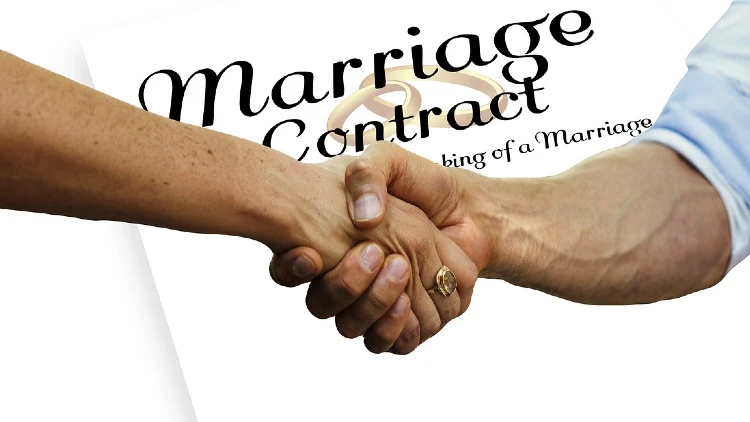
(Image: Gerd Altmann11)
When filing immigration documents, a certified marriage certificate is essential. This is especially true for those who want to apply for a green card for marriage in the Citizenship and Immigration Service8 office.
Lastly, parties will need certified marriage records when they apply for letters of administration. These documents grant a spouse individual rights to the property of their deceased partner.
In the US, anyone who wants to change their name after marriage should first get a court order or marriage certificate. The next step is to inform the US Department of State and the Social Security Administration of the name change.
The party will then have to apply for updated identification documents such as state-issued identification and driver’s license. Lastly, the party will have to inform all relevant agencies, including financial institutions, places of work, and utility providers.
Marriage records costs vary according to the information needed, the platform used for the search, and the location where the marriage record is stored. Interested parties will find the fees displayed on the online platforms when requesting these documents.
A few online platforms will ask the interested party to register and pay a subscription fee and then provide any online public record for free. Most states have statistics organizations and departments and centralized marriage records that offer easy access.
The best way to find the cost of procuring a certified or uncertified copy of a marriage record is to contact the state vital records office. In most cases, the certified copies of marriage records are the ones that require the most expense. Any additional copies or uncertified copies are usually very cheap, or sometimes they are even free.
An interested party will need to provide some or all of the information below to conduct a free marriage license record search:
In several states, requesters must complete request forms and pay the necessary fees to obtain marriage records. The forms vary from state to state, each requiring specific information.
The following table will provide links to public marriage records across various states and where to conduct marriage license searches.
The best place to find out if someone is divorced or married free is in the court clerk’s office in the county where the marriage or divorce took place. Additionally, interested parties can search through county libraries that have records of this information. However, the party will have to pay a fee to obtain a copy of this record.
Marriage license records are documents available to the general public in the US. One can use a variety of methods to obtain this information. However, the legal way to get a free marriage license records to search is through the county clerk’s office where the marriage took place, and it’s important to note that you will be charged if you want to leave with a copy of the marriage record.
A marriage record identification/filing number refers to the number used to record the marriage license when filed by the court clerk in the county where the marriage occurred.
You can conduct a marriage license search by visiting the CDC website, going to the specific state where the marriage was performed, filling out the form provided, and paying the fee required. The results will be provided momentarily.
Alternatively, you can visit the office of the clerk of the court where the marriage was issued, provide the necessary information, and you can go through the marriage record.
You can visit the county clerk’s office (where the marriage occurred) and obtain these records at a small office.
GenWed refers to a genealogical research database that is free and contains an online directory of marriage records in the United States.
1Vital Records, Nd. California Department of Public Health. Retrieved on August 13, 2020, from <https://www.cdph.ca.gov/Programs/CHSI/Pages/Divorce-Mail.aspx>
2Are Divorce Records Public? Nd. DivorceNet. Retrieved on August 16, 2022, from <https://www.divorcenet.com/resources/are-divorce-records-public.html>
3Texas Vital Records. (2022). Texas Vital Records. Retrieved June 03, 2022, from <https://www.texas.gov/texas-vital-records/>
4Where to Write for Vital Records. (2022). Centers for Disease Control And Prevention. Retrieved September 26, 2022, from <https://www.cdc.gov/nchs/w2w/foreign.htm>
5Marriage License Public Lookup (beta). (2022). mycourts.IN.gov. Retrieved September 26, 2022, from <https://publicaccess.courts.in.gov/mlpl/>
6Indiana Marriages Through 1850. (2022). Indiana State Library. Retrieved September 26, 2022, from <https://digital.statelib.lib.in.us/legacy/search.aspx?index=3>
7Indiana Marriages 1958-2021. (2022). Indiana State Library. Retrieved September 26, 2022, from <https://digital.statelib.lib.in.us/legacy/search.aspx?index=2>
8United States Government. (2022). Marriage and Marital Union for Naturalization. U.S. Citizenship and Immigration Services. Retrieved September 26, 2022, from <https://www.uscis.gov/policy-manual/volume-12-part-g-chapter-2>
9Photo by Nick Greaux. Cropped, Resized, Changed Format. Pexels. Retrieved June 20, 2024, from <https://www.pexels.com/photo/hands-of-a-couple-wearing-their-wedding-ring-15231247/>
10Photo by Abbey Chapman. Cropped, Resized, Changed Format. Pexels. Retrieved June 20, 2024, from <https://www.pexels.com/photo/bouquet-of-flowers-beside-marriage-certificate-11858228/>
11Photo by Gerd Altmann. Cropped, Resized, Changed Format. Pixabay. Retrieved June 20, 2024, from <https://pixabay.com/photos/prenup-before-handshake-contract-4011424/>
We use cookies to ensure that we give you the best experience on our website. If you continue to use this site we will assume that you are happy with it